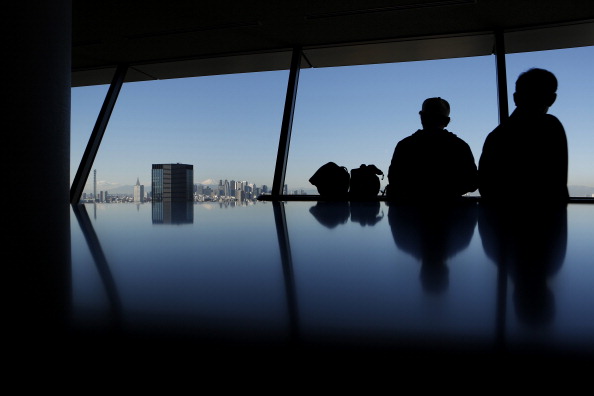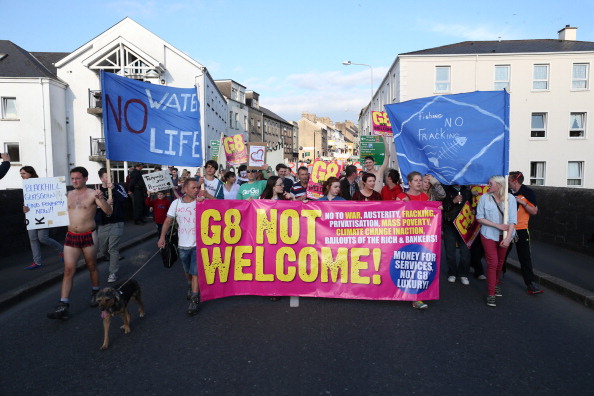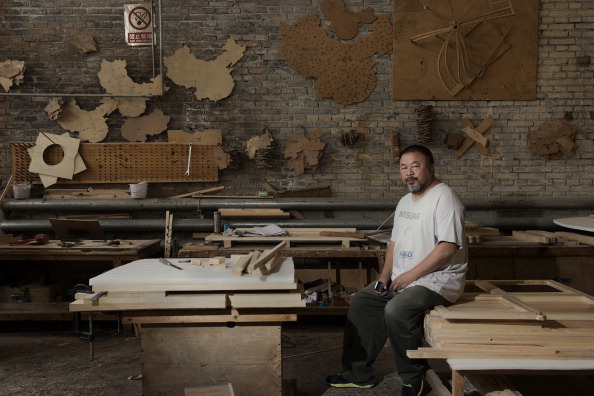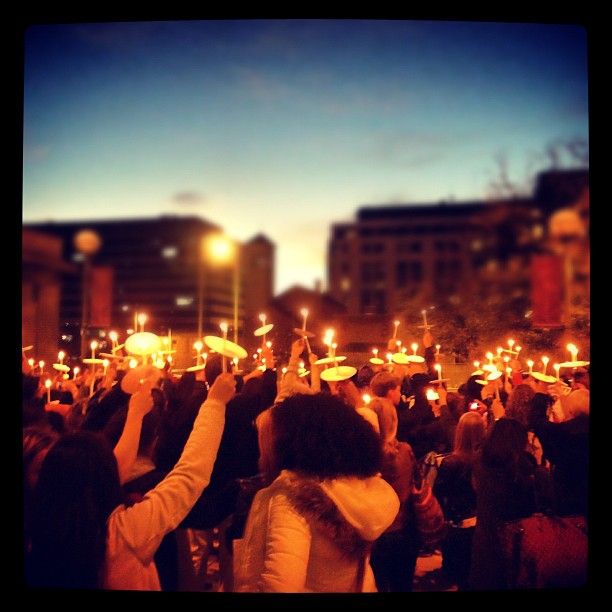
Mass surveillance threatens human rights and human dignity (Photo Credit: Ashraf Amra/Anadolu Agency/Getty Images).
By Naureen Shah, Advocacy Advisor at Amnesty International USA
Who does U.S. surveillance impact? Millions of people around the world, including activists, scholars, artists and journalists. Not only can the U.S. government can keep their emails, phone calls and other activities under watch, but it can share that information with other governments – including governments that target and retaliate against anyone they view as a political dissenter. The result: a climate of fear, where people worry that their emails or phone calls could endanger themselves or anyone with whom they communicate.
Journalists

Journalists like Naomi Klein interview political activists around the world for articles that expose repressive governments and corporations.
“Some of my sources will decline to share information with me if they believe their communications are being monitored by the United States,” Klein wrote in a 2008 affidavit for the lawsuit Amnesty v. Clapper, which challenged U.S. surveillance law.
Klein said some of her sources feared that by communicating with her, they risked retaliation by the U.S. government – denials of visas or placement on a “watchlist.”
More often, Klein said, these political activists feared “that the United State will share information about them…and that their own governments will retaliate as a result.”
Protesters

Protesters and activists around the world are vulnerable to U.S. spying on the content of their emails and Internet activity. That’s because U.S. law – under section 702 of the Foreign Intelligence Surveillance Act – permits surveillance “to acquire foreign intelligence information” of people reasonably believed to be outside the United States.
But the law does not require the government to demonstrate that surveillance targets are foreign agents, engaged in criminal activity, or connected even remotely with a designated “terrorist organization” or “terrorist.” Surveillance need only be for the purpose of gathering “foreign intelligence information,” a term that’s so broadly defined that it can include any information that relates to U.S. “foreign affairs.” That could include emails about peaceful protests outside international meetings, human rights conferences, or activists’ meetings on just about any issue with a connection to U.S. foreign policy.
Artists

Mass surveillance like the kind authorized under current U.S. law creates a climate of fear, where creative thinking and expression are stunted.
As Chinese artist Ai Wei Wei put it: “When human beings are scared and feel everything is exposed to the government, we will censor ourselves from free thinking. That’s dangerous for human development.”
Ai Wei Wei was arrested in China in 2011 and detained without charge, but later released.
“Privacy is a basic human right, one of the very core values. There is no guarantee that China, the U.S. or any other government will not use the information falsely or wrongly,” he recently wrote.
Writers

Surveillance undermines freedom of expression by making people afraid to speak out or share their ideas – including writers and authors. A recent PEN America study found that 85% of its members who responded to the survey feared government surveillance. Nearly a quarter had deliberately avoided certain topics in phone or email conversations, and another 9 percent had seriously considered it.
As an open letter signed by Nobel laureates Orhan Pamuk, J.M. Coetze, and hundreds of other authors put it: “A person under surveillance is no longer free.”
Worshipers

Everyone has the right to associate freely – and without arbitrary government snooping.
But the U.S. government can use section 215 of the USA PATRIOT ACT to collect phone records of religious, political and activist organizations and their members – to learn who they are talking to, when and for how long. Collection of this “metadata” can create a chilling effect. As Rev. Rick Hoyt of the First Unitarian Church of Los Angeles, who joined a lawsuit, put it: “Our church members and our neighbors who come to us for help should not fear that their participation in the church might have consequences for themselves or their families. This spying makes people afraid to belong to our church community.”
You

If your emails, online chats or Skype calls mention a person or topic of “foreign intelligence” interest – say, Pussy Riot’s release or Pope Francis – they may be surveilled even if the U.S. government doesn’t believe you yourself have any “intelligence” value. That’s because section 702 of the Foreign Intelligence Surveillance Act permits surveillance of emails and other communications about a target – not just those to or from a target. So if you aren’t a U.S. citizen or permanent resident – and even if you are – you are susceptible to surveillance based on your beliefs and interests. And we are still talking about spying without any notice, let alone a day in court to challenge these invasions of your right to privacy.
Mass surveillance threatens human rights and human dignity – that’s why we need President Obama to put human rights at the center of surveillance reform. Read more about Amnesty International’s letter to President Obama.
this org is the best in the world so i love to work with you people .
United States citizens, as well as tens of thousands around the world, have opened themselves up to surveillance simply by becoming members of social media. If a person lays her life bare to the internet universe on Facebook, why would she then believe that her government should know nothing about her?
I do not condone US surveillance on private citizens, but I perceive extreme dichotomy with individuals claiming they want privacy, yet simultaneously displaying their lives on any available media. Those who choose to be a part of internet communication must realize that they have chosen boundary compromised personal information over privacy. One cannot have both worlds.
I wholeheartedly agree! We live in a society largely populated with people under the erroneous assumption that their lives are so important and of such fascination to everyone that they feel compelled to take photos of scones or comment that they are at the dry cleaners… Really? For some reason the vast majority of people don't seem to grasp the concept that if you put something online, it isn't just seen by people you know, it can be seen by just about everybody and once it is online, it is forever! People also don't understand the safety aspect of updating the world with your current location, especially kids… Pedophiles love it! You can't have it both ways, either you open your life up to everyone or you don't but you can't complain when people (or governments) see what you have put online of your own free will…
I couldn't agree more. I'm amazed at what people are willing to post on FB, Twitter, and so on-and these same people shake their fists and prattle on and on like rabid spider monkeys about their right to privacy.
I tend to be quite benign with my public posts, but I would suppose that that makes me more suspicious in the minds of the government watchers.
this org is the best in the world so i love to work with you people .
At the beginning, it is just a kind of fear about speaking out or sharing their ideas. In the end, people such as writers and artists will control themselves not to be picked up.
Under survillance – my expereience since circa mid 2012 to current (November, 2015): I first noticed men hanging around my house. One day, a lorry went past and then there was a loud bang. Looking
back to see the cause of the noise, I noticed one of these men reacting in a way that his time had been
wasted as I now had seen him near me. It was his reaction that made me take much more notice of
these men. What follows (not in chronological order) are some of my experiences. (More following).
(Australian: continuing: Telephone calls being monitored – one 'friend' knew things he shouldn't. That's how I found out. Another 'friend' frequently had a bag. Sometimes I would notice him putting a hand into the bag; I realised that I was being recorded. I would meet someone to chat. A person would sit nearby with a mobile phone pointed towards me. This person usually had earphones. Somertimes false taxi drivers: Occasionally I was asked why I was going to my destination. One even asked where my parents had been born!! True.
Australian – continuing: False work: Someone in the group would be pointing a mobile phone in my direction. These false works usually started / occured either on the first occasion or shortly later. Being conditioned with a nod. This lasted about two (2) years then it has become a stranger nods when I using something for the first time. "We are on to you!" In the last eight (8) months, young people are giving me a very quick smile. Rarely I get a nod and a quick smile from the same person. Mobile phones are used to record where I go and what I buy. I've enen had a mobile phone pointed at my face as I left a lift; left a toilet cubicle. (Both true!).
I've noticed women are much more adept at spying than men. I've mentioned buying: Sometimes a person hangs around. Sometimes an employee calls out information such as how much I spent last time I was at a store. Encountering "new employees" is common. Strangers sitting opposite / close by while I'm conducting business. Another almost daily experience was a stranger asking one question such as (and these are my experiences): "Where were you born?" "What type of camera is that?" "Are you a member of X club?" "Do you play Lotto?" (Lotto is a gambling game).
Australian: Final blog. .People I haven't seen for years suddenly (literally) re-entering my life. During the first few minutes of the reunion I'm asked about a very specific thing. Then I realise that this is no "Let's catch up." reunion but one organised by the agency monitoring me. I've been tricked into giving samples eg of my handwriting; my salvia.
Another thing: The 'flash' emitted is a steady white light controlled by some invisible means. In Cambodia, it's orange. In China it's a steady white light as in Australia. Chinese spys basically use the same techniques as in Australia. Oh, that reminds me. In Cambodia, I was given "the nod" and I was under no misunderstanding about the intention of the nod.
Who does U.S. observation affect? A large number of individuals around the globe, including activists, researchers, craftsmen and writers. Not exclusively can the U.S. government can keep their messages, telephone calls and different exercises under watch, however it can impart that data to different governments – including governments that objective and strike back against anybody they see as a political nonconformist. The outcome: an atmosphere of dread, where individuals stress that their messages or telephone calls could imperil themselves or anybody with whom they convey.